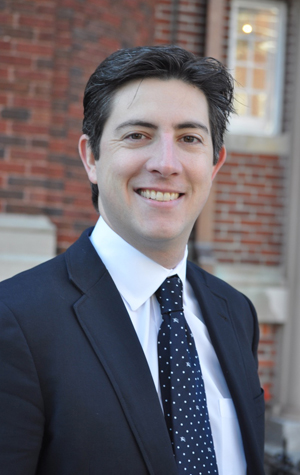Made possible through the support of a BU alumnus based in Taiwan who wishes to remain anonymous, Career Development Professorships in the area of East Asia studies have been established, Jean Morrison, BU provost and chief academic officer, has announced. The East Asia Studies Career Development Professorships recognize junior faculty in the College of Arts & Sciences, the College of Fine Arts, the College of Communication, and the School of Management whose research is focused on East Asia. The first professorships have been awarded to Lei Guo, a College of Communication assistant professor, and Edward Cunningham, a College of Arts & Sciences assistant professor.
As with other career development professorships awarded at BU, each East Asia Studies Career Development Professorship provides three years of partial salary support for the recipient’s school or college, plus an annual research fund for the faculty member. An additional two professorships, nominated by academic deans and selected by the Office of the Provost, are expected to be named three years from now, according to the official announcement January 29.
The inaugural East Asia Studies Career Development Professors have been cited for notable accomplishments in their areas of study, innovative approaches to research and teaching, and research that bridges disciplines and cultures. They are demonstrating firsthand “BU’s continued and growing commitment as a global research university,” Morrison notes.
“As East Asian culture, business, politics, and economic development enjoy ever-expanding global influence, we are delighted to recognize the exceptional scholarship of talented young faculty in this area,” she says. “From the impact of development on energy policy to the power of social media to transform cultures, Professors Cunningham and Guo are producing exciting original research and, in doing so, helping to bring us a greater understanding of this critical region. We are excited to see where their research takes them and for their futures as BU faculty members.”
Guo, a COM assistant professor of mass communication, advertising, and public relations and a member of the division of emerging media studies, examines the development of theories on the effects of media, emerging media technologies and democracy, and international communication. “Before the internet age,” Guo says, “news media told us what we think and how we think, but we are wondering whether the mainstream media have the same effects today.” A specialist in cross-cultural communications, she is studying citizen journalism and the political impact of social media in China, Taiwan, and Hong Kong.
Known as “agenda studies,” Guo’s research examines whether, and how much, media set the agenda for what issues the public views as most important. She has studied the media’s impact on elections in both the United States and Taiwan. “I would argue that the mainstream media—established news organizations—still set public agenda and still hold symbolic power, but I’ve also done a lot of research on how new media technologies like social media influence the lives of marginalized communities, such as ethnic minority groups,” she says. For example, she did a study on Weibo and citizen journalism in China and their influence on environmental protests. When social media reflect millions of people’s protests against a proposed chemical plant and that opposition goes unreported by the mainstream media, “this becomes a good tool for reporting,” says Guo, who earned a PhD from the University of Texas at Austin.

Edward Cunningham, a CAS assistant professor of earth and environment, will use the East Asia Studies Career Development Professorship to further his research on the relationship of Asian economies and politics. Photo courtesy of Edward Cunningham
China specialist Cunningham, a CAS assistant professor of earth and environment, uses research in comparative political economy to explore how institutions and policy shape the technology and fuel the choices of Chinese and Asian companies. He says his interest in East Asia was sparked in high school by a program at his school, Milton Academy. He plans to use the grant to deepen his work with students as well as colleagues. In research that has sent him to mainland China for nearly a third of every year over the past decade, he and his team have surveyed a broad range of citizens’ views on public policy, satisfaction with government policies, and most recently, how Chinese view the political importance of the environment. “We’ve done the survey every other year since 2002, and it’s the only survey of its kind except for one done by the Chinese themselves,” says Cunningham, who is fluent in Mandarin. He holds a PhD in political science from MIT.
He has a strong interest in green innovation in the developing world, and in collaboration with other faculty, is working to create what economists call equilibrium models, which help researchers and governments calculate the political effects of economic changes. Through surveys in mainland China, he hopes to explore the economy of the carbon tax and determine through statistical analysis whether a tax is more effective than trade caps or other environmental policy choices. In related work, Cunningham and his collaborators are looking at ways to show how emissions by individual nations in the developing world have contributed to climate change, a dynamic model that could lead to “a climate equity tool that can both visualize and quantify historical responsibility, and also be used for mitigation.”














































Related Stories
Latest East Asia Studies Career Development Professor Chosen
Pardee School faculty member researches global trade in rare earth elements
2018–2019 Career Development Awards Honor Eight Junior Faculty
Funding for research ranging from driverless car safety to Buddhist religious history
Inaugural Levine Career Development Professor Named
Research by ENG’s Kulis makes it easier to analyze Big Data
Post Your Comment